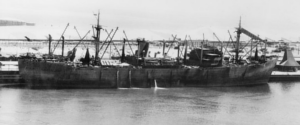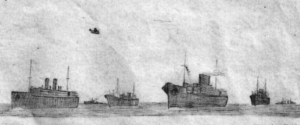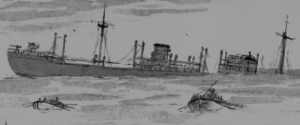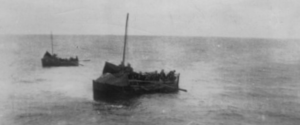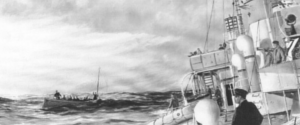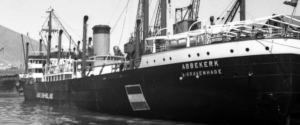
By Chaplain William C. Taggert (US Army)
And Christopher Cross
(Doubleday, Doran & Compagny, Inc. Garden City, New York 1943)
In this book there is a chapter about the Tjilitjap evacuation on Abbekerk.
To download the book click here,
Or read the chapter:
In a few hours we reached the outskirts of Tjilatjap. Lieutenant Dodd went to town to find out where we were to go. Meanwhile we were getting hungry. As we searched for food, I became so faint that I almost collapsed. One of the men found a banana. That was the best banana I have ever eaten.
At the docks we were ordered to begin loading the ship immediately.
“But the men haven’t been fed. They re hungry”, I protested.
“We don t have time to eat. We gotta get out of here. If we stop to eat it may be our last meal.”
It was reason enough, but I knew the condition of the men. How could they load the ship when they were hungry? I talked to one of the officers about it.
“Sorry, Chaplain, those men have to stand by their trucks for loading orders.”
“But they ve had an all-night journey and they re hungry. Give them a few minutes to eat. I’ll watch the trucks and call them back if you need them before they re finished. They ll work twice as fast after they ve eaten something.”
The officer agreed.
“Chow, men, chow!” I called loudly. That was a mistake. Everyone who heard that thought it was an invitation. Unfortunately there wasn’t enough for the hundreds of soldiers and sailors, Dutch and natives crowded on the dock. The men ate the cold meat, jelly, and bread that Mess Sergeant Dan Fitz prepared and then started to load the Dutch ship, Abbekerk, which was to take us away from Java.
“Hi, Chaplain.”
“Hello, Bill.”
I turned and saw some of the sailors from the Marblehead and the Houston who had come to Tjilatjap by bus.
“Sure glad to see you. Maybe you can help us, Chaplain.”
“What s up, fellows?”
“We can t get on the navy ship that was supposed to take us. They can t care for us.”
“Well, why can t you come on our ship?”
“Do you think it s possible?”
“Wait here, boys, go and see.”
I talked to Major Thompson, commander of the American troops on the ship, about the navy boys. “I’ll take care of them. Well feed them.”
There were only about six staterooms on the entire ship. These were reserved for the critically sick. One of the sailors was put into a stateroom and the rest of them slept on the starboard side of the upper deck. I gathered some blankets, army comforters, and flying equipment for their bedding. One of them used my bedroll. I collected as many blankets as I could for them. I knew that the slightest breeze would give them chills.
The loading continued under lights. At ten o clock the whine of the air-raid sirens came. The lights quickly went out on the docks, but the lights on the ship remained lit, as the switch couldn’t be found. For a few long minutes our ship was a perfect target.
“Turn out those lights!”
The shouts came from the dock and the ship. Then a few started shooting at the lights with their .45 before the switch was found. For almost an hour I crouched in the darkness near the sailors, waiting for the attack. The all-clear signal was finally heard. The lights went on, and the loading of the ship was resumed. Hour after hour they kept on with the loading. They couldn’t possibly get all the cargo into the small freighter. A good deal of it would have to be left behind. From the deck I heard a sergeant saying, “Drive that truck up here first. That’s the chaplain’s things, see? It’s gotta get on.”
Thirteen hundred men Dutchmen, British, American and Australian soldiers were on the Abbekerk, a freighter with normal accommodations for only nineteen. To feed the men a kitchen composed of a unit of four field ranges was set up on the deck. Hardtack, eggs (until they became rotten), and “corn willie” made up our meals which we ate out of our mess kits or pans. “Corn willie” a form of corned-beef hash was part of every meal. There were enough lifeboats for the sick only. A few rafts had been rigged up out of bamboo poles and empty gas drums. If it became necessary to abandon ship the orders were to jump overboard and try to swim to one of these improvised life rafts.
As we traveled south the nights became colder. The sailors were in agony. The strong winds cut into their burned, sensitive skin. One of the sailors lay on the deck shivering. He was sicker than the rest. The charred skin on his arms, legs, and chest was covered with bandages. I covered him with my blankets and helped him find a comfortable position. After a while he fell asleep, murmuring, “Thanks, Chaplain Bill, you re swell to us”, He lay there close to me, like a sick child, tossing, turning, and mumbling in his sleep.
The sea was rough and the boat rolled from side to side. I put my arm across his cot as he slept to keep him from falling off. I was awakened during the night by a crash and a scream. I jumped to my feet, grabbed my flashlight, and ran below deck. An Australian soldier was under a pile of lumber that had become loose when the ship rolled. I quickly lifted the large planks from his body. Blood was streaming from a gash over his eye.
“Badly hurt?”
“No sir, not so bad.”
We awoke Captain Crane in the sick bay, who patched up the Aussie’s eye.
On Saturday at about six o clock in the evening someone noticed a black speck in the sky. In a moment all eyes were on that speck as it came toward us.
“Rising sun! It’s the Japs!” someone yelled. The alarm to rush to battle stations was sounded. One of the sailors ran to the deck railing and tried to jump overboard. With some difficulty he was brought back to his cot and quieted. I went down to the main deck, stopping for a moment to pray. “It doesn t look like we have much chance of getting through this, Lord,” I said to myself. We have few guns. We have no escort ships to engage the enemy. We have only You for protection. If it is Your wish that we die now, please help us to live our last few minutes as You would want us to.” I said “Amen” aloud and went out on the main deck.
Sergeant Donohue was standing there with a number of soldiers. There was no officer to organize them.
“Where are those 5o-caliber machine guns, Chaplain? ”
“I think they re below deck”
I jumped on the hatch: “Sergeant Donohue, why don’t you lead these men? Why don’t you get that stuff up here on deck where it’ll do some good?
“Fellows, follow Sergeant Donohue!”
A line was quickly formed from below deck. In a moment the boxes of ammunition for the 5o-caliber guns were moving up. On my way back to the sailors I stopped near one of the gun positions and said to the soldier, “Do a good job!” He winked confidently.
I sat with the sailors as the Jap plane came over us. The plane began to dive, and our big gun boomed in the backaft. The smaller guns opened up. Our fire must have been too heavy. The Jap climbed, circled, and returned. Our guns roared again. The ship quivered. Several times the plane returned and then disappeared. The sailors were nervous, restless.
“At least, if we were on one of our own ships!”
“Yeah, then we could fighting”, “Here we just float along waiting for them to come back.” “Sure, now that they know where we are they’ll send back a squadron of bombers.”
“Or maybe he ll radio our position to the Jap fleet”
“What do you think, Chaplain?”
“I think we ought to stop worrying. Worrying isn t going 130 to frighten away any Jap planes or subs. We’ve got good guns and good gunners. God protected us from that one Jap and He can protect us again if the enemy returns”.
A hospital orderly came to me. “You re wanted in the sick bay, Chaplain”, One of the men had become hysterical again. He had flung himself face down and was beating the floor with his fists. He didn’t want to die on a ship, he screamed hysterically. He wanted to get off. Shell shock had left him with a fear of travelling on ships. A few minutes before we left Tjilatjap he had disappeared from the ship. We found him on the dock just before sailing time. I picked James up from the floor and succeeded in calming him.
At about ten o clock Sunday morning we had Church Call. The men pulled the hymnbooks I had given them at Djokjakarta out of their pockets. Sergeant Worthimer played my portable organ which by this time was quite scratched and battered. I felt keenly the power of God in that simple service on the deck, “Shorty” Harvey Clark chatted with me after the service.
“This is the first time I’ve been to church in six years”.
“What made you come today, Shorty?”
“It’s Bill Oglesby’s fault. I was sitting on my bunk during the attack yesterday, about to take a few drinks from that quart bottle I had brought out of Java. So Bill sees me and asks me what good it’s do me. It’ll steady my nerves, I told him. ‘Wait’, he says, ‘I got something that ll do you more good than that.’ And he hands me the Bible and tells me if I’d read it and believe, come what may I d have the strength to face it.”
“So what d you do, Shorty?”
“Well, I took the Bible from him, but when he left I also took a drink of liquor. Well, during the raid I notice Bill’s as calm as a cucumber and I’m just as nervous. So when I heard there’s gonna be a service this morning I decided to come. Maybe there’s something to what Oglesby said”

